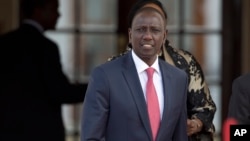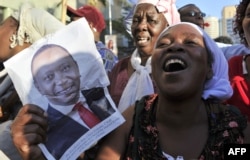Rights groups reacted with dismay Tuesday at the International Criminal Court's decision to end its trial against Kenyan Deputy President William Ruto, saying it left victims without justice and showed the limits of pursuing cases against powerful individuals.
But analysts also suggested the Hague-based court had learned some important lessons that might help it move forward in fulfilling its mandate.
Human Rights Watch Senior International Justice Counsel Elizabeth Evenson called the ruling a "hugely disappointing decision."
But she added, "the court has shown ... it's not complacent in the face of the setbacks and challenges over the past few years, and it wants to do things differently and better."
In a written statement released late Tuesday, the court said the prosecution had failed to deliver sufficient evidence to convict either Ruto or Kenyan broadcaster Joshua Sang. Both were charged with crimes against humanity for their alleged roles in violence following Kenya's 2007 elections that killed more than 1,000 people and forced hundreds of thousands of others to flee.
Future trial possible
But the majority ruling, delivered by two of the three-judge panel, did not close the door completely to a future trial, and said the current decision may be subject to appeal, the statement read.
Meanwhile the third, dissenting judge found there was enough evidence to pursue a case and potentially convict the defendants.
In 2014, the Hague-based court also dropped crimes-against-humanity charges against Kenyan President Uhuru Kenyatta, who was also implicated in the same post-election violence.
Altogether, the court pursued charges against six people, all of which have now been dropped.
In both the Ruto and Kenyatta cases, witnesses either refused to testify or changed their stories. In both cases, the prosecution suggested witnesses had been bribed or intimidated, and accused the Kenyan government for failing to fully cooperate.
In its ruling Tuesday, the court did not dismiss the possibility of witness interference and political meddling "that was reasonably likely to intimidate the witnesses."
Reacting to the news, Kenyatta said the court's decision "brings to a close what has been a nightmare for my country."
He also released a statement criticizing the ICC for blindly pursuing an "ill-conceived, defective agenda."
Lessons for court
Anthony Dworkin, a specialist on human rights and international justice at the European Council on Foreign Relations, said the ruling underscored the court's difficulty in bringing powerful figures to justice — and in securing the cooperation of participating states.
"All of this points to the complicated position of having an institution like the ICC which is supposed to be an independent judicial body, that doesn't pay attention to the messy business of power politics," Dworkin said. "And yet it's sitting in the middle of an international political system which is very dependent on power politics."
While the ICC must continue to pursue powerful individuals implicated in crimes, "it has to make pretty sure it has extremely solid cases before it starts moving to trial," he added.
For her part, Evenson of Human Rights Watch believes the court needs to draw some key lessons: "stronger investigations, stronger witness protection programs, and also stronger and more consistent support from the international community."
Nonetheless, she points to last month's conviction by another international tribunal of former Bosnian Serb leader Radovan Karadzic on similar war crimes charges.
"It shows that it is possible to hold politically powerful individuals to account," Evenson said. "It may be a long and difficult road, but it is possible."













